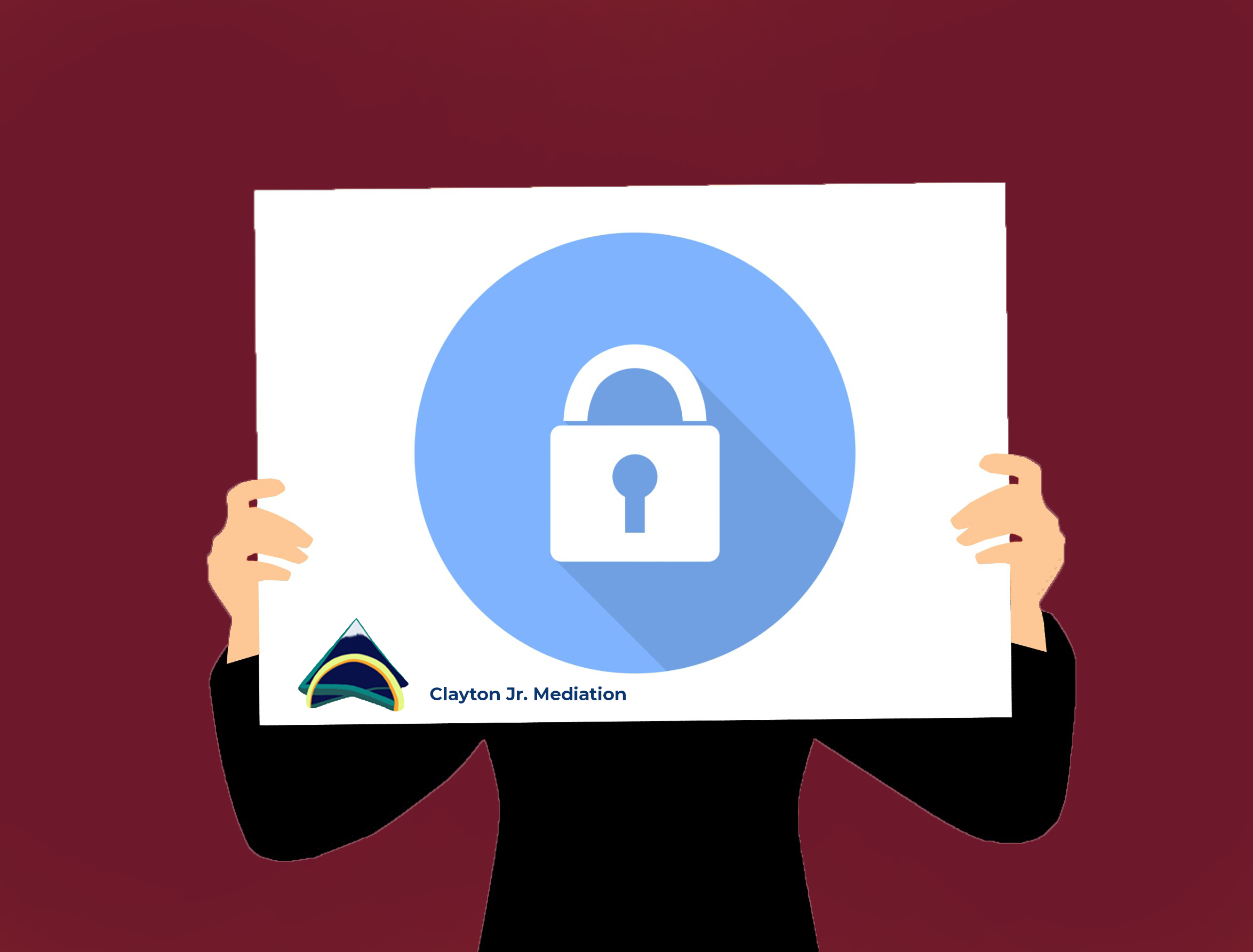
Confidentiality plays a key role in mediation, specifically regarding ethical principles and legal provisions. Particular guidelines and rules concerning privacy in mediation may encourage individuals and groups to utilize the conflict resolution process. In general, confidentiality seemingly adds value to mediation for a variety of reasons. The following short article discusses this idea specifically by providing some basic info points and brief reflections on the topic.
While mediators may promote candidness, parties entering into mediation have a choice about what is shared during the process. Further, anything communicated shall be kept confidential in subsequent legal and administrative actions. In Colorado, the Colorado Dispute Resolution Act (CDRA) provides “broad statutory privilege” in that any oral or written communication used in mediation (preceding and proceeding) cannot be used as evidence in any future administrative or judicial proceeding (**). The only exceptions to the rule include any relevant agreement reached by parties to be made public, information approved to be shared by all participants, and info gathered that demonstrates the intent to commit a felony, inflict bodily harm, or threaten the safety of a child under the age of 18 years old (**). It is worth mentioning that different communities, states, and nations possess mediation styles and regulations that can vary slightly. However, the common and foundational template of mediation (which confidentiality is a critical part of) generally extends across the globe. For example, it can be seen that the mediation code of conduct for the American Bar Association (national) offers very similar confidentiality provisions as the CDRA (state) and the International Mediation Institute (international) (*)(**)(***).
Good practice and conduct guidelines in mediation are outlined by various dispute resolution practitioners, conflict resolution theorists, and various organizations such as those highlighted in the writing here. With respect to these principles, it can be seen that a mediator’s duty to uphold confidentiality is treated as quintessential. Taking a deeper dive, we can see that there are other important responsibilities that pertain to that notion. In accordance with the CDRA, mediators shall destroy all notes from the mediation and are not permitted to share any information exchanged during the process with any non-participant. Other related duties for mediators may also include informing the parties about the role of confidentiality in mediation — additionally, to work with parties in order to create any unique guidelines on confidentiality specific to the mediation at hand (*)(***). Regarding mediation education, when “a mediator participates in teaching, research or evaluation of mediation, the mediator should protect the anonymity of the parties and abide by their reasonable expectations regarding confidentiality” (*, 6).
Even though confidentiality in mediation provides autonomy where information-sharing is concerned, in many cases, it may give parties the motivation to speak more openly and candidly. This is due in large part to the rules stipulating that mediation communications shall not be shared outside the process (notwithstanding the exceptions discussed above). To this end, confidentiality in mediation can help participants to establish trust amidst challenging communication barriers, whereas, trust is commonly defined as a readiness and openness to be vulnerable in the presence of interdependent relationships and risk (****). Mediators may attempt to strengthen confidentiality by asking to caucus (meet) one-on-one with parties — parties commonly make this request as well. Specific communication that is exchanged between the mediator and one party during caucusing may not be shared unless that party gives explicit permission to the mediator advising otherwise. Meeting one-one-one can be quite valuable as it may allow parties to speak more comfortably and to become more creative — it can alleviate the worry of other parties interfering or overhearing sensitive information. The caucusing strategy also oftentimes influences structure and method in mediation processes. For instance, in some cases, agendas and styles of communication used in mediation may need to be adapted to meet interests and needs, and the guidelines and rules surrounding confidentiality.
It seems there are few guiding mediation principles and rules that rise to the level of importance in which confidentiality does. Such a capacity can make dispute resolution more appealing and effective. Moreover, a mediator’s duties relating to confidentiality gives practitioners critical ethical and legal responsibilities to fulfill. In a sense, confidentiality in mediation gives participants practical and moral guidance. There doesn’t appear to be a significant body of counter evidence or viewpoints that highlight why confidentiality should not play a major part in mediation currently. While it will be interesting to see how it’s role may evolve or change, confidentiality may reasonably continue to be a key component of mediation for the time being.
CJ Clayton Jr.
06/09/2021
Works Cited:
(*) American Bar Association. 2005. “Model Standards of Conduct for Mediators”. Pages 1-10. https://www.americanbar.org/content/dam/aba/administrative/dispute_resolution/dispute_resolution/model_standards_conduct_april2007.pdf
(**) Colorado Judicial Branch. 2018. “Mediation Guide for Colorado Courts”. Found on https://www.courts.state.co.us.
(***) International Mediation Institute. n.d. “Code of Professional Conduct”. https://imimediation.org/practitioners/code-professional-conduct/
(****) Rousseau, D. M., Sitkin, S. B., Burt, R. S. & Camerer, C. 1998. “Not so different after all: A cross-discipline view of trust”. Academy of Management Review, 23 (3), 393 – 404.
